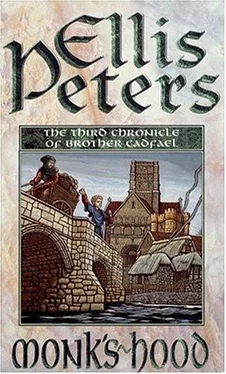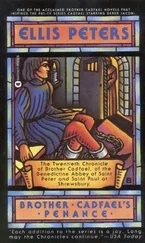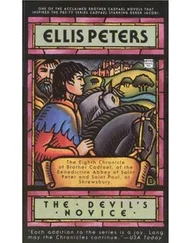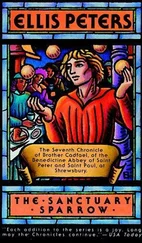Yet he knew her at once. Forty-two years between, and he knew her! He had not, it seemed, forgotten very much. The eager way she leaned to him now, the turn of her head, the very way she coiled her hair; and the eyes, above all, large, direct, clear as light for all their darkness.
At this moment she did not, thank God, know him. Why should she? He must be far more changed than she; half a world, alien to her, had marked, manipulated, adapted him, changed his very shape of body and mind. All she saw was the monk who knew his herbs and remedies, and had run to fetch aids for her stricken man.
“Through here, brother … he is in here. The infirmarer has got him to bed. Oh, please help him!”
“If I may, and God willing,” said Cadfael, and went by her into the next room. She pressed after him, urging and ushering. The main room was furnished with table and benches, and chaotically spread with the remains of a meal surely interrupted by something more than one man’s sudden illness. In any case, he was said to have eaten his meal and seemed well; yet there were broken dishes lying, shards on both table and floor. But she drew him anxiously on, into the bedchamber.
Brother Edmund rose from beside the bed, wide and dismayed of eye. He had got the invalid as near rest as he could, wrapped up here on top of the covers, but there was little more he could do. Cadfael drew near, and looked down at Gervase Bonel. A big, fleshy man, thickly capped in greying brown hair, with a short beard now beaded with saliva that ran from both corners of a rigid, half-open mouth. His face was leaden blue, the pupils of his eyes dilated and staring. Fine, strong features were congealed now into a livid mask. The pulse for which Cadfael reached was faint, slow and uneven, the man’s breathing shallow, long and laboured. The lines of jaw and throat stood fixed as stone.
“Bring a bowl,” said Cadfael, kneeling, “and beat a couple of egg-whites into some milk. We’ll try to get it out of him, but I doubt it’s late, it may do as much damage coming up as going down.” He did not turn his head to see who ran to do his bidding, though certainly someone did; he was hardly aware, as yet, that there were three other people present in the house, in addition to Brother Edmund and Mistress Bonel and the sick man. Aelfric and the maid, no doubt, but he recognised the third only when someone stopped to slide a wooden bowl close to the patient’s face, and tilt the livid head to lean over it. Cadfael glanced up briefly, the silent and swift movement pleasing him, and looked into the intent and horrified face of the young Welshman, Meurig, Brother Rhys’s great-nephew.
“Good! Lift his head on your hand, Edmund, and hold his brow steady.” It was easy enough to trickle the emetic mixture of mustard into the half-open mouth, but the stiff throat laboured frightfully at swallowing, and much of the liquid ran out again into his beard and the bowl. Brother Edmund’s hands quivered, supporting the tormented head. Meurig held the bowl, himself shivering. The following sickness convulsed the big body, weakened the feeble pulse yet further, and produced only a painfully inadequate result. It was indeed late for Gervase Bonel. Cadfael gave up, and let the paroxysms subside, for fear of killing him out of hand.
“Give me the milk and eggs.” This he fed very slowly into the open mouth, letting it slide of itself down the stiff throat, in such small quantities that it could not threaten the patient with choking. Too late to prevent whatever the poison had done to the flesh of Bonel’s gullet, it might still be possible to lay a soothing film over the damaged parts, and ease their condition. He spooned patient drop after drop, and dead silence hung all round him, the watchers hardly breathing.
The big body seemed to have shrunk and subsided into the bed, the pulse fluttered ever more feebly, the stare of the eyes filmed over. He lay collapsed. The muscles of his throat no longer made any effort at swallowing, but stood corded and rigid. The end came abruptly, with no more turmoil than the cessation of breathing and pulse.
Brother Cadfael laid the spoon in the little bowl of milk, and sat back on his heels, He looked up at the circle of shocked, bewildered faces, and for the first time saw them all clearly: Meurig, the bowl with its horrid contents shaking in his hands, Aelfric grim-eyed and pale, hovering at Brother Edmund’s shoulder and staring at the bed, the girl—Brother Mark had not exaggerated, she was very pretty, with her yellow hair and black eyes—standing frozen, too shocked for tears, both small fists pressed hard against her mouth; and the widow, Mistress Bonel, who had once been Richildis Vaughan, gazing with marble face and slowly gathering tears at what remained of her husband.
“We can do no more for him,” said Brother Cadfael. “He’s gone.”
They all stirred briefly, as though a sudden wind had shaken them. The widow’s tears spilled over and ran down her motionless face, as though she were still too bemused to understand what caused them. Brother Edmund touched her arm, and said gently: “You will need helpers. I am very sorry, so are we all. You shall be relieved of such duties as we can lift from you. He shall lie in our chapel until all can be arranged. I will order it …”
“No,” said Cadfael, clambering stiffly to his feet, “that can’t be done yet, Edmund. This is no ordinary death. He is dead of poison, taken with the food he has recently eaten. It’s a matter for the sheriff, and we must disturb nothing here and remove nothing until his officers have examined all.”
After a blank silence Aelfric spoke up hoarsely: “But how can that be? It can’t be so! We have all eaten the same, every one of us here. If there was anything amiss with the food, it would have struck at us all.”
“That is truth!” said the widow shakily, and sobbed aloud.
“All but the little dish,” the maid pointed out, in a small, frightened but determined voice, and flushed at having drawn attention to herself, but went on firmly: “The one the prior sent to him.”
“But that was part of the prior’s own dinner,” said Aelfric, aghast. “Brother Petrus told me he had orders to take a portion from it and send it to my master with his compliments, to tempt his appetite.”
Brother Edmund shot a terrified look at Brother Cadfael, and saw his own appalling thought reflected back to him. Hastily he said: “I’ll go to the prior. Pray heaven no harm has come to him! I’ll send also to the sheriff, or, please God! Prior Robert shall do as much on his own account. Brother, do you stay here until I return, and see that nothing is touched.”
“That,” said Cadfael grimly, “I will certainly do.”
As soon as the agitated slapping of Brother Edmund’s sandals had dwindled along the road, Cadfael shooed his stunned companions into the outer room, away from the horrid air of the bedchamber, tainted with the foul odours of sickness, sweat and death. Yes, and of something else, faint but persistent even against that powerful combination of odours; something he felt he could place, if he could give it a moment’s undisturbed thought.
“No help for this,” he said sympathetically. “We may do nothing now without authority, there’s a death to account for. But no need to stand here and add to the distress. Come away and sit down quietly. If there’s wine or ale in that pitcher, child, get your mistress a drink, and do as much for yourself, and sit down and take what comfort you can. The abbey has taken you in, and will stand by you now, to the best it may.”
In dazed silence they did as he bade. Only Aelfric looked helplessly round at the debris of broken dishes and the littered table, and mindful of his usual menial role, perhaps, asked quaveringly: “Should I not clear this disorder away?”
Читать дальше












